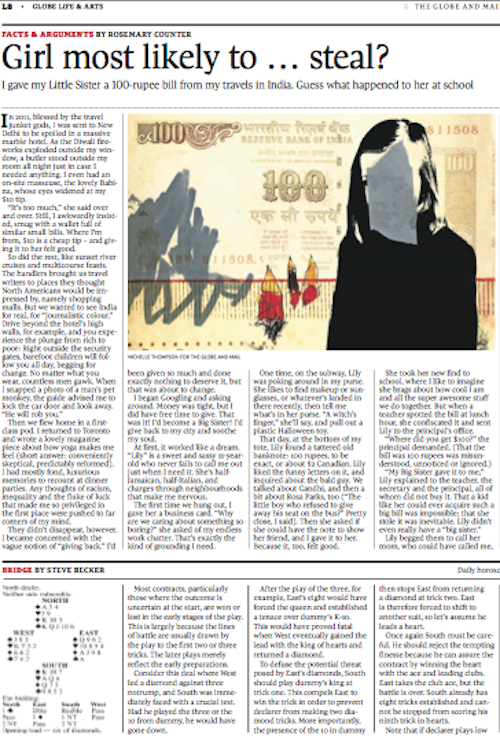I gave my Little Sister a 100-rupee bill
…and she ended up in the principal’s office
In 2011, blessed by the travel junket gods, I was sent to New Delhi to be spoiled in a massive marble hotel. As the Diwali fireworks exploded outside my window, a butler stood outside my room all night just in case I needed anything. I even had an on-site masseuse, the lovely Babina, whose eyes widened at my $10 tip.
“It’s too much,” she said over and over. Still, I awkwardly insisted, smug with a wallet full of similar small bills. Where I’m from, $10 is a cheap tip – and giving it to her felt good.
So did the rest, like sunset river cruises and multicourse feasts. The handlers brought us travel writers to places they thought North Americans would be impressed by, namely shopping malls. But we wanted to see India for real, for “journalistic colour.” Drive beyond the hotel’s high walls, for example, and you experience the plunge from rich to poor: Right outside the security gates, barefoot children will follow you all day, begging for change. No matter what you wear, countless men gawk. When I snapped a photo of a man’s pet monkey, the guide advised me to lock the car door and look away. “He will rob you.”
Then we flew home in a first-class pod. I returned to Toronto and wrote a lovely magazine piece about how yoga makes me feel (short answer: conveniently skeptical, predictably reformed). I had mostly fond, luxurious memories to recount at dinner parties. Any thoughts of racism, inequality and the fluke of luck that made me so privileged in the first place were pushed to far corners of my mind.
They didn’t disappear, however. I became concerned with the vague notion of “giving back.” I’d been given so much and done exactly nothing to deserve it, but that was about to change.
I began Googling and asking around. Money was tight, but I did have free time to give. That was it! I’d become a Big Sister! I’d give back to my city and soothe my soul.
At first, it worked like a dream. “Lily” is a sweet and sassy 11-year-old who never fails to call me out just when I need it. She’s half-Jamaican, half-Italian, and charges through neighbourhoods that make me nervous.
The first time we hung out, I gave her a business card. “Why are we caring about something so boring?” she asked of my endless work chatter. That’s exactly the kind of grounding I need.
One time, on the subway, Lily was poking around in my purse. She likes to find makeup or sunglasses, or whatever’s landed in there recently, then tell me what’s in her purse. “A witch’s finger,” she’ll say, and pull out a plastic Halloween toy.
That day, at the bottom of my tote, Lily found a tattered old banknote: 100 rupees, to be exact, or about $2 Canadian. Lily liked the funny letters on it, and inquired about the bald guy. We talked about Gandhi, and then a bit about Rosa Parks, too (“The little boy who refused to give away his seat on the bus?” Pretty close, I said). Then she asked if she could have the note to show her friend, and I gave it to her. Because it, too, felt good.
She took her new find to school, where I like to imagine she brags about how cool I am and all the super awesome stuff we do together. But when a teacher spotted the bill at lunch hour, she confiscated it and sent Lily to the principal’s office.
“Where did you get $100?” the principal demanded. (That the bill was 100 rupees was misunderstood, unnoticed or ignored.)
“My Big Sister gave it to me,” Lily explained to the teacher, the secretary and the principal, all of whom did not buy it. That a kid like her could ever acquire such a big bill was impossible; that she stole it was inevitable. Lily didn’t even really have a “big sister.”
Lily begged them to call her mom, who could have called me, but the school refused. Instead, Lily was told to sit there until she confessed. And, like Rosa Parks, just a bit, she sat there the rest of the day.
There is heartbreaking racism, injustice and inequality on the rough streets of New Delhi, but there’s no shortage of the same right here. It’s not concealed behind concrete gates, but it’s pervasive in subtler, sicker ways. It seeps even into a Grade 6 class in a Catholic elementary school in the great multicultural city of Toronto. Here, the politics of that crisp bill, who owns it and who has no business touching it, are great enough to shame a kid who dares to challenge the status quo, even unknowingly.
“It was no big deal,” Lily told me the next day, “I’m not sad any more.”
She is over it, because she has to be; she must go back to school. I am not; my heart aches for her, because she’s not old enough to see what I see, and because she’ll still be seeing it long after I’m gone.
